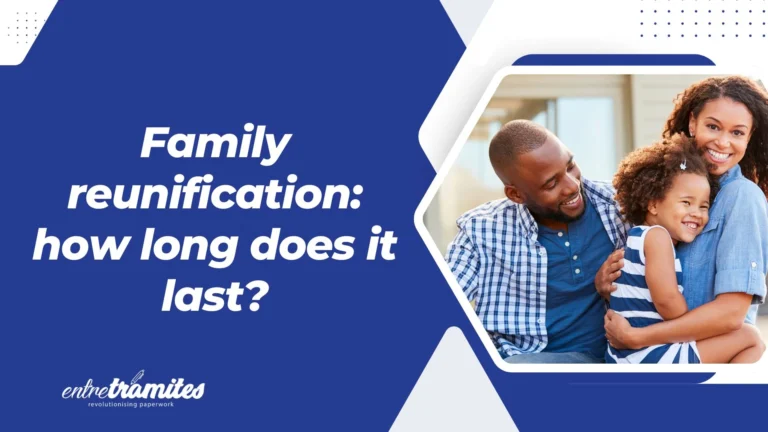After the Council of Ministers of the Spanish Government approved in July the reform to the Immigration Law promoted by the Minister of Migrations, José Luis Escrivá; This August 15, the new regulation came into force that seeks to make it easier for Spanish businessmen to hire foreigners in their countries of origin and opens doors so that immigrants who already live in Spain can regularize and work… among other novelties.
About 5 and a half million foreigners live in Spain, more than a third of them come from Latin America, according to government data. Many of them find themselves in a vicious circle in which they cannot legally work because they do not have a residence permit, but they cannot have a residence either because they do not have a working relationship.
The new Immigration Law largely resolves this vicious circle. How does it do it? In this article we tell you, keep reading!
Procurement at origin
Hiring in the workers’ own countries of origin will be made more flexible, and hiring for seasonal workers will also be improved.
In the case of the latter, workers who participate in agricultural campaigns in Spain will be able to access a 4-year authorization in which they will be able to work up to 9 months per year, with the obligation to return to their countries after each period.
If these conditions are met, these workers may apply for a two-year extendable residence and work permit, as a ‘reward’.
In addition, the reform wants to improve the Catalog of Occupations with Difficult Coverage, this is known as the list of professions for which employers have difficulty finding staff and allow them to hire professionals at source.
For a long time, this catalog only shows that coaches, athletes and merchant ship personnel are needed in Spain; However, the reality is different. So with the reform, they will take a more realistic picture of the Spanish labor market and it will be updated every 3 months.
Students
Other main beneficiaries of this new Immigration Law are foreign students enrolled in Spanish centers. Well, now they can legally work up to 30 hours a week.
Also, at the end of their studies, they will be able to stay for another year without having to request an extension of their stay in Spain.
The amendments to the law allow the stay authorization, with some specific criteria, to be converted into a work authorization. Something very positive for the country, since it is a way of guaranteeing that those who have studied and have been trained in third grade -highly qualified professionals- can access the Spanish labor market.
Before the reform, whoever had a study permit could NOT work. And if she did, it was irregularly.
A case study: Laura Rosero, a 25-year-old Colombian immigrant, told El Mundo that she moved to Madrid 3 years ago to do a Master’s in Film. The young woman studied for a degree in Social Communication and Journalism and won a scholarship for European studies that gave her a little economic solvency, but not enough to support herself.
When she settled in the capital, she realized that with only a student visa she could not work beyond an internship contract, she survived with a 400-euro scholarship.
“I remember that my colleagues said they would go out for a few drinks and I only had 40 euros a month left over to spend on leisure, an amount that anyone knows that in one night goes away immediately,” Rosero said.
So, most of the time, Laura renounced the invitations from her friends and stayed in her apartment in Puerta del Ángel, reports El Mundo.
This case is experienced by many foreign students in Spain, currently 50,000 students from other countries reside in this country. For this reason, the new Immigration Law opened work and study facilities at the same time, with the possibility of permanently settling in the country under certain conditions as the case may be.
“It would have helped me to prosper,” Laura told El Mundo about the new reform, which would have allowed her to study and work at the same time. “It would have been a great help to me.“
Rooting by training
Continuing with the question of studies, from now on people who have been in Spain irregularly for a minimum period of 2 years will be able to obtain a 12-month residence permit if they agree to carry out regulated training for employment.
In other words, irregular people will be able to access the labor market by first going through training. The training must be mainly in sectors in which it is determined that there is a need for labor and other specific trades.
Thus, in addition to social and labor roots, this rooting by training is added to these ways so that foreigners can regularize their situation.
Family reunification
Finally, another of the great novelties of the reform: the relatives of regular foreigners in Spain will now also receive the authorization to work for their own account and for others when they receive their residence permit.
Also, the family reunification requirements are made more flexible when they affect minors, disabled people or people in a situation of vulnerability.
Before the reform to the Immigration Law, people received a residence permit, but they had to wait for a work permit; now, with the changes, when family reunification is renewed, work authorization is acquired.
On the other hand, other amendments to the law are that they streamline the requirements for self-employed workers from third countries, and create a Unit for the Processing of Immigration Files: a type of “one-stop shop” to streamline and facilitate procedures.
If you want to know many more details about this reform, you can read them in this article on our blog, by clicking here.
In short, all this new reform to the Immigration Law is very favorable both for the labor and social future of Spain, as well as for all foreigners dreaming of emigrating to this country and finding opportunities.
Do you need more information about The new Immigration Law?
If you want to do any immigration procedure, make sure it has an expert team in the field.At Entre Trámites we invite you to know all our immigration services here. Fill in our contact form and we will call you to help you as soon as possible, schedule a free online consultation or just text our WhatsApp.




